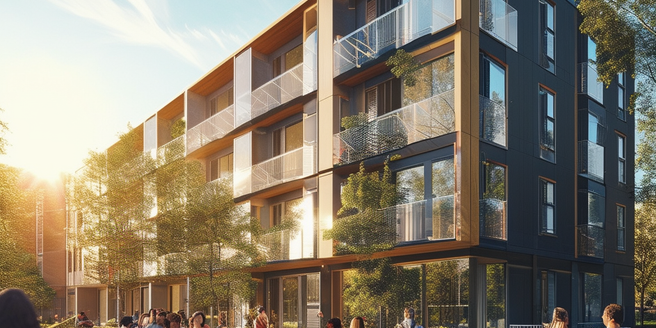
Understanding the Context: The State of Affordable Housing Today
In examining the current state of affordable housing, numerous factors come into play. These include not only economic factors but also social and political considerations. Particular emphasis is placed on burgeoning property prices, static income rates, and heightened urbanization pressures. Today, millions of Americans are burdened by housing costs that significantly eat into their livelihoods, ultimately fostering financial instability and hardship. By delving deeper into these issues, it becomes increasingly clear that the affordable housing crisis is not simply a product of market forces, but a complex problem intertwined with issues of societal inequity and policy failure.
The Roots of The Housing Crisis: An Economic Perspective
While often attributed to market dynamics, the roots of the housing crisis extend far beyond supply and demand imbalances. This crisis is not a short-term phenomenon but has its roots in long-term structural issues. Furthermore, it highlights the widening wealth inequality in society. From an economic perspective, the crisis is the cumulative result of decades-long shifts in housing policies, labor market transformations, and deep-seated systemic biases. The commodification of housing, alongside the erosion of the social safety net and stagnating real wages, have all contributed to the proliferation of housing instability across the nation.
Policy Failure or Market Failure: What’s Causing the Crisis?
The persistent question regarding the affordable housing crisis is whether it is a product of policy failure or market failure. It’s not an easy question to answer since both elements have their share of influence. One must consider the impact of socioeconomic factors, such as income inequality and lack of access to employment opportunities, which often intersect with these issues. However, in reality, both policy and market incompetences have contributed to the problem. Insufficient government intervention, particularly in enforcing affordable housing regulations, coupled with market inefficiencies such as speculative investment and gentrification, have allowed the crisis to persist with increasing severity.
Potential Solutions: An Overview of Promising Practices
Addressing the affordable housing crisis requires multi-faceted solutions that intersect various aspects of policy, market, and societal change. Recognizing the necessity of these diverse strategies can help streamline efforts towards housing one and all. Public awareness campaigns to increase understanding and support for these initiatives are also a critical element of the strategy. Notably, partnerships between private entities and government organizations have been tremendously effective. Promising practices include the implementation of inclusionary housing policies, increased funding for affordable housing programs, renovation of existing properties into affordable units, and the promotion of community land trusts. Each approach presents potential pathways towards alleviating the housing crisis and fostering a future of housing stability.
Case Studies: Lessons Learned from Successful Affordable Housing Models
There is much to be learned from successful affordable housing models around the world. From the social housing approach employed in Vienna to the cooperative housing model in Zurich, these cases offer valuable insights into different solutions implemented. Furthermore, an ongoing exchange of experiences and ideas among these successful models will enable a more dynamic and innovative approach to affordable housing across different regions. Moreover, these models also give an indication of how diverse cultural, political, and economic contexts influence the approach to housing. Studying their respective strategies, outcomes, and challenges allows for an adaptative and proactive approach to addressing affordable housing provision in different settings.
Looking at the Future: How We Can Sustainably Address the Housing Crisis
As we look to the future, undertaking sustainable measures to address the housing crisis is paramount. This lies not just in the number of affordable houses built, but in implementing a holistic approach that considers environmental sustainability, social equity, and economic viability in tandem. Along with this, fostering community input and participation in the decision-making process is crucial for attaining desirable outcomes. This means opting for construction materials and methodologies that are eco-friendly without compromising on longevity and function. Central to this will be fostering a housing system that is resilient, inclusive, and accessible to all, regardless of income or social standing.
